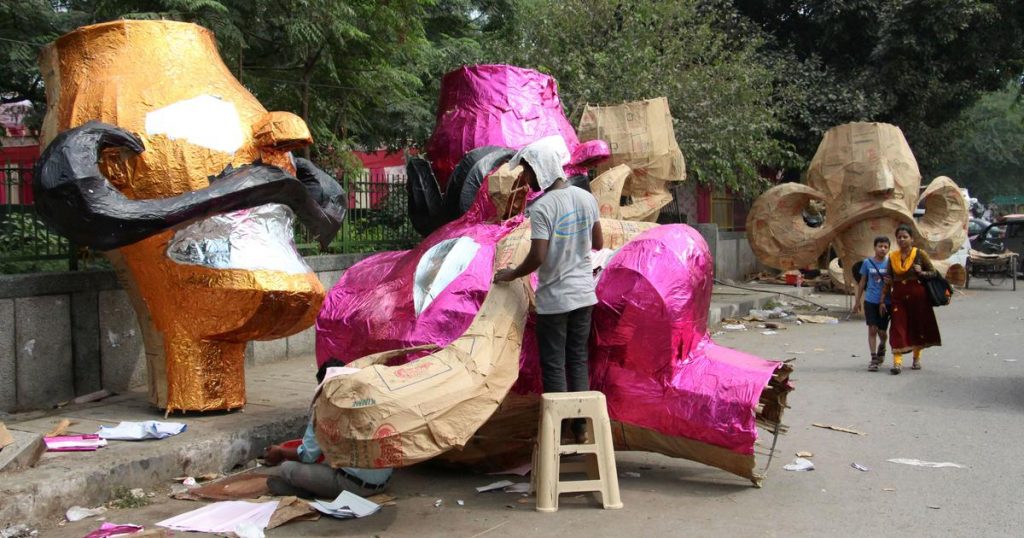New Delhi: It seems that the economic slowdown that India is going through has also hit Ravana hard. The effigies are getting ready for the big day, ready to be shipped to all corners of the country, but the festive excitement is missing this ‘Dussehra’ in most parts of the national capital.
Crammed, dimly lit and far away from the main road, the effigy market in west Delhi’s Subhash Nagar was relocated from the bustling Titarpur village near the Tagore Garden Metro station in 2018. But both business – and life – has taken a battering with no amenities being provided, the artisans pointed out.
Believed to be one of the largest of its kind in Asia, the Titarpur market would be its busiest a few days before ‘Dussehra’, with massive Ravana heads lined up on the road. Now, the effigy makers occupy what are essentially two unkempt grounds, with only tall grass in the name of a workplace.
There’s no water, no electricity and no sanitation facilities either, said the artisans, who leave their round-the-year low-paying jobs ahead of the festive season to make some extra cash by making and selling effigies.
Though busy giving final touches to the replicas of the tall and mighty 10-headed Ravana, and his brothers Kumbhkaran and Meghnad, the uncertainty of taking back home a decent income is evident from their faces. The artisans are mainly daily wage labourers from Rajasthan, Haryana and Bihar.
“When we shifted, the authorities promised us basic amenities like sanitation, water and electricity. Now here we are making effigies in a place worse than a jungle,” said Mahendra Ravanawalla, as he wrapped the bamboo frame with old sarees.
They earn money, but they also have to shell out a lot from their own pockets – Rs 300-400 everyday to arrange for drinking water.
“The few lights that can be seen here are also installed by us, for which we spent over Rs 2,000,” said Ravanawalla, who has been making effigies for the last 45 years.
When asked about the lack of facilities needed for the proper functioning of the market, a South Delhi Municipal Corporation (SDMC) spokesperson refused to comment.
Two years ago, the SDMC had alleged that the artisans were encroaching on public land and blamed the effigies on the pavements for traffic jams in the area.
After the Delhi High Court’s intervention, the SDMC last year identified the two spaces in Subhash Nagar for the artisans to make the effigies at a charge of Rs 1.50 per square feet per month.
This is the second year of the market’s new home. Orders come in not just from the Delhi-NCR region but also from Uttar Pradesh, Himachal Pradesh, Punjab, Rajasthan and even abroad.
According to Dase Ravanwalla, business has taken a hit also because many of their regular customers are not aware of the relocation.
Several orders also got cancelled because Resident Welfare Associations (RWAs) couldn’t get permissions for burning of effigies.
“There is no signboard informing that there is ‘Ravan Mandi’ ahead or something like this. The administration didn’t do even that much. A majority of our business is killed there and then only,” said 51-year-old Dase, who has over 12 workers helping him.
The height of an effigy ranges from five to 50 feet and the cost averages about Rs 500 per foot, lower than the last few years, Dase stated.
What hurts them the most is the injustice, Dase and his colleagues pointed out. Many alleged that while most of them were asked to relocate, some effigy makers continued operating out of the Titarpur village with ‘full protection from the authorities’.
“Woh sab dabbang log hai (They all our powerful people). They had told us earlier also that ‘no matter what, we won’t be touched’. And look how true they were. The High Court and SDMC orders are for poor people, not for powerful people like them,” stated Dase.
Some effigy makers are still operating in Titarpur, with a total of around 10 of them at both the locations. Several made-to-order bamboo frames along with numerous figureheads of Ravana are displayed across the pavement beneath the Tagore Garden metro station.
“Other effigy sellers were asked to leave because they were duping people. They would make 15 effigies and book orders for 20. That’s the reason they were asked to move from here by the police,” said a person taking orders for Ravanawalla Baba, one of the five shopkeepers still doing business in the old location.
PNN & Agencies
